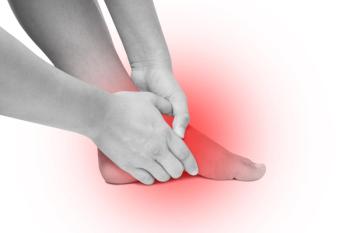
Knee Pain: Another Ailment That Semaglutide Might Help With
Positive results reported for pain from knee osteoarthritis among those who have obesity.
A
Osteoarthritis of the knee is a common ailment and chief complaint for many. Progression of the condition often leads to chronic pain, disability and, consequently, reduced mobility.Obesity is, not surprisingly, a primary risk factor for knee osteoarthritis because is associated with inflammation, metabolic dysfunction, and mechanical stress on joints.
General observations and treatment guidelines note that weight reduction through calorie deficits and physical activity can reduce the risk of structural progression of osteoarthritis.Although interventions such as bariatric surgery are effective at weight management, the surgery is practical only for some, and there are significant risks and costs associated with it.Therefore, semaglutide and the other glucagon-like peptide 1 drugs may fill an unmet need for nonsurgical interventions aimed at weight reduction and reducing osteoarthritis pain, specifically knee pain.
The randomized, double-blind, placebo-controlled trial involved 407 participants across 11 countries with obesity and moderate-to-severe knee osteoarthritis pain. The participants were all classified as obese and had moderate knee osteoarthritis.Most participants were women, and their average age was 56.
The primary end points of the STEP 9 trial measured the percentage change in body weight and assessed the participants' pain score through the Western Ontario and McMaster Universities Osteoarthritis Index (WOMAC). The index is utilized to assess pain, stiffness, and physical function in patients with OA of the knee and hip.The Short Form Health Survey (SF-36) was used to provide a physical function score, a confirmatory secondary point for the study.
For both end points, weight reduction and pain relief, there were clinically significant reductions compared to the placebo. Semaglutide achieved a 13.7% reduction in body weight compared with 3.2% in the placebo group.
Semaglutide was also associated with a substantial decrease in knee osteoarthritis pain, as measured by the WOMAC pain score. There were observed improvements in physical function among participants in the semaglutide group by the SF-36 physical component summary score. Additionally, the authors noted that the use of analgesic agents decreased significantly during the trial among randomly assigned to take the semaglutide.The use of acetaminophen and nonsteroidal anti-inflammatory drugs decreased more than the placebo group.
Although Bliddal and the team acknowledge they were not investigating the mechanism of action that the GLP-1 had on knee osteoarthritis specifically, they suggest that the weight reduction is the most likely contributing factor to the observed reduction in knee pain.They also noted that previous GLP-1 studies demonstrated an anti-inflammatory and antidegradative effect.
The authors' failure to assess metabolic and inflammatory markers was a noted limitation of the study, as they could not accurately study the effect of semaglutide on the pathophysiology of knee osteoarthritis. Additional limitations highlighted by the authors include lack of imaging at follow-up and lack of assessing adherence to dietary and physical activity recommendations.
The study’s findings, however, do suggest that semaglutide might be an effective therapeutic option for a significant portion of the population suffering from knee osteoarthritis who may also be overweight.
Semaglutide for weight loss may help reduce the need for other medical interventions, such as pain medications, physical therapy, and even joint replacement surgeries, by effectively managing pain and improving physical function. As with many studies, this one creates a need for urther research to evaluate the long-term efficacy and safety of semaglutide for the treatment of knee osteoarthritis in obese individuals.
Newsletter
Get the latest industry news, event updates, and more from Managed healthcare Executive.























